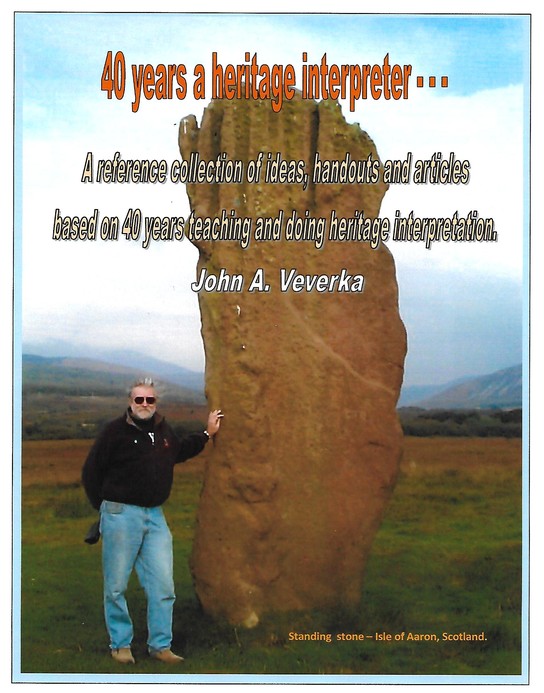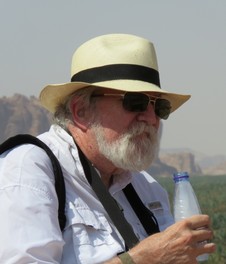John Veverka & Associates
Main menu
- Home Page
- Our Range of Services
- Separator 2
- Interpretive Coaching
- Interpretive Planning
- Interpretive Plan Outline
- Interpretive Training
- John Veverka Resume
- Qualifications
- NEW Advanced Interp. Text Book
- Separator 11
- InterpNEWS
- Separator 12
- Library
- Expert in Interpretation
- JVA NEWS, Courses and Updates
- Certificates
- Separator 47
- Planning/Design of Interpretive Panels
- Separator 48
- Interpretive Writing
- Separator 49
- Interpretive Writing Course
- Separator 50
- Interpretive Trails Course
- Separator 56
- Interpretive Panels Course
- Separator 55
- Introduction to Heritage Interpretation Course
- Separator 54
- Interpretive Planning & Design of Marketing Brochures Course
- Training for Interp. Trainers
- Separator 57
- Interpretive Exhibits Course
- Separator 58
- Interpretive Master Planning Course
- Separator 59
- Interpretive Planning for Scenic Byways.
- Critiquing and Coaching Interpretive Staff
- Separator 31
- Advanced Interpretive Planning
- Interpretive Training Center Course Catalogue
- Separator 32
- Interp. for International Visitors course.
- Separator 33
- Interpretive Exhibits Evaluation
- Separator 34
- Interp. Center Feasibility Analysis Course.
- Separator 35
- Interp. for Commercial Tour Providers
- Separator 36
- Interpretive Researchers Guide for Visitor Studies
- Separator 37
- Separator 13
- Interp. Planning for Historic Homes
- Separator 14
- Heritage Interpretation Training Center
- Interpretive Planning for Botanical Gardens
- Separator 15
- An introduction to planning and presenting live interpretive programs and tours for Museum/Heritage Site Docents and Volunteers.
- Developing Marketing Plans for Heritage & Tourism Sites and Attractions
- Separator 16
- Interpretation Book Store
- Separator 17
- Heritage Interpretation Resource Center
- Interpretive Planning for Historic Farms
- Developing Successful Partnerships
- Developing Interpretive Outreach Programs
- Community Interpretation Planning
- Interpreting Gravestones and Historic Cemeteries
- Using Interpretation to Accomplish Management Objectives.
- An Interpreters Guide for Survival Economics.
- Separator 18
- Innovative Strategies for Interpretive Media and Services Planning.
- Separator 19
- A Curators Guide for Developing Gallery Tours.
- Advanced Interpretive Writing - Technical Publications
- Page 2
- Advanced Interpretive Services for Managers, Supervisors, Team Leaders and Sr. Staff.
- Separator 20
- Advanced Interpretation for Chiefs of Interp. - Interpretive Managers - Regional Interp. Specialists
- Interpreting Critical Issues.
- Separator 21
- Developing Commercial Interpretation for Resorts, Cruise Ships, Campgrounds and Tourism Attractions.
- Separator 38
- Planning and developing a new commercial tour guiding business.
- Separator 39
- Interpretive Evaluation, Visitor Studies and Site Assessment Center
- Separator 40
- The Center for Interpretive Planning Advancement & Excellence.
- Developing Requests for Proposals (RFPs)
- Separator 41
- Planning and Facilitating Focus Workshops
- Separator 42
- InterpNEWS Advertising Details
- Planning for Interpretive Experiences
- 40 Years a Heritage Interpreter
- Separator 43
- Interpretive Techniques - The Rest of the Story Course
- Separator 44
- Certified Professional Interpretive Planner Certificate
- Certified Professional Interpretive Program
- Certified Professional Interpretive Trainer certificate program.
- Separator 53
- Certified Professional Heritage Interpreter certificate program.
- Separator 52
- Certified Professional Interpretive Writer certificate program.
- Visitor motives for attending interpretive programs.
- Separator 45
- Exhibit Rehab Course
- Separator 46
- Developing Training Workbooks & Manuals
- Separator 22
- Planning for Railroad Museums and Sites.
- Separator 51
- Climate Change Interpretation Course.
- Separator 23
- When there's nothing left but the story - interp. storytelling.
- Separator 24
- Interpreting Legends Myths and Fables
- Separator 25
- InterpSHARE - Seminars 2022
- Separator 26
- Interpreting Invasive Species
- Separator 27
- Interpretiing Edible Insects
- Separator 28
- Interpretaive Planning for Climate Change
- Separator 29
- HITC Climate Crisis Resource Center
- Separator 30
- Separator 5
- PUP Members Only
- Starting a new Interp Consulting Business
- Panels 4 Week Course
- Separator 8
- Interpretive Writing - 4 Week Course
- Marketing - 4 Week Course
- Separator 7
- Intro to Interpretation - 4 Week Course
- Separator 9
- Interp Climate Change - 4 Week Course
- Separator 10
- Exhibit Rehab 4-Week Course
- Separator 6
- Level 1
- Johns Interpreters Blog
- Separator 4
- Economics for Heritage Interpreters
40 Years a Heritage Interpreter
The Heritage Interpretation Training Center and
John Veverka & Associates
New Heritage Interpretation Reference Collection.
I am pleased to present my reference collection of ideas, handouts and articles based on 40 years of teaching and doing heritage interpretation projects, seminars, training workshops, and having articles published in various interpretive publications. This new book will also be used in our Heritage Interpretation Training Center courses as a main reference manual for articles on a diversity of interpretive course topics
About the author.
Water rest stop -
John received his B.S.(1976) and M.S.(1978) degrees majoring in Interpretive Services from The Ohio State University, with additional minors in marketing, motivational psychology, and advertising. During this time at OSU, John developed and taught a course on Interpretive Master Planning, was also on the staff of the Ohio State University Museum of Zoology (academic years) and spent five summers as an Interpretive Naturalist with Ohio State Parks. After graduating with his M.S. degree, John was recruited by Alberta Provincial Parks in Canada (1978-
He has also been an Adjacent Professor for New York State Universities summer Heritage Tourism Institute, and for North Carolina State Universities summer Heritage Tourism Certificate Program for working tourism professionals. John also created two Heritage Interpretation courses for Newcastle University (England) for their MS global distance learning program in Heritage Management. He lectures widely on Heritage Interpretation and Interpretation Planning, and serves as a consultant to many different agencies and organizations world-
John is the director of the International Heritage Interpretation Group that consists of:
-
Consultancy) www.heritageinterp.com.
-
-
in introductory and advanced heritage interpretation).
-
-
John has been a NAI Certified Interpretive Planner, Certified Interpretive Trainer, and Certified Professional Heritage Interpreter (Canada). He is also a National Association for Interpretation Fellow.
Way back in 1972 after several years in the Army, I was back at The Ohio State University starting to work on a degree majoring in ecology/zoology. The problem was I loved too many different things, archaeology, architecture, cultural heritage sites, museums, zoos, and on and on. As a part of my work study I had a job at the Ohio State University Museum of Zoology working in the malacology department (sea shells). But as this was an academic year appointment I needed a summer job. Thus, the "rest of the story". I saw an advertisement for seasonal naturalists with Ohio State Parks. I applied for a naturalist position and my new lifetime career was born. I worked 5 academic years at the Museum of Zoology and 5 summers as an interpretive naturalist until I graduated, after a change of majors, with my B.S and M.S. in Interpretation in 1978. I was lucky that OSU had interpretation as a major -
This is one of my collections of articles on interpretive theory and philosophy, handouts from some of my interpretive training courses and other interpretive ideas that I developed over the years. Some of these were just written the past year, some are older. The main job of a interpretive professional is to learn all you can about your profession, contribute ideas and theories about your profession, get loads of on-
Copyright 2018, John Veverka & Associates Heritage Interpretation Training Center Resource Manual, April, 2018.
What articles, handout masters or other reference materials are in this collection/library?
Index to articles…
Interpretive theory and principles.
-
-
-
-
-
easier and more effective.
-
-
Markets of One and more… (updated)
-
-
-
Planning for interpretive programs and media.
-
-
-
-
-
Interpretation techniques and storytelling.
-
-
-
Why art often needs an interpreter's touch to be really understood.
-
-
Planning and contracting for interpretive services.
-
Interpretive Projects.
-
-
-
-
It's all about the visitors.
-
Ordering Information
If you would like a copy, sent to you as a PDF E-
As noted above, once you receive your copy it is the intent of this resource book to allow you, other interpreters or interpretive trainers to freely use and copy any of these documents for their own interpretive training and to help advance the interpretive profession. Please reference any documents you may use for these purposes. Use the ideas and information -
<form action="https://www.paypal.com/cgi-
<input type="hidden" name="cmd" value="_s-
<input type="hidden" name="hosted_button_id" value="JKQ3FCXHQDGAQ">
<input type="image" src="https://www.paypalobjects.com/en_US/i/btn/btn_buynowCC_LG.gif" border="0" name="submit" alt="PayPal -
<img alt="" border="0" src="https://www.paypalobjects.com/en_US/i/scr/pixel.gif" width="1" height="1">
</form>